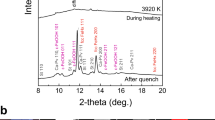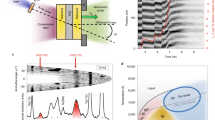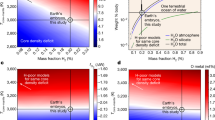Abstract
The possibility of dissolution of hydrogen in the Earth's core through the reaction Fe+H2O→FeO+FeHx was noted by Stevenson1, but has since been largely disregarded because the solubility of H in Fe was thought to be too low and the volatility of H2O too high to deserve serious consideration2. However, a recent paper3 from this laboratory showed that the solubility of H in Fe is very large at high pressures, and that H could indeed be a major cause of the density deficit of the Earth's outer core. In this paper I demonstrate, by investigating the nature of the iron–water reaction in more detail in light of recent advances in the knowledge of impact dehydration of planetesimals in the accretion process, that the iron–water reaction may well have played a decisive role in the evolution of the Earth.
This is a preview of subscription content, access via your institution
Access options
Subscribe to this journal
Receive 51 print issues and online access
$199.00 per year
only $3.90 per issue
Buy this article
- Purchase on Springer Link
- Instant access to full article PDF
Prices may be subject to local taxes which are calculated during checkout
Similar content being viewed by others
References
Stevenson, D. J. Nature 268, 130–131 (1977).
Stevenson, D. J. Science 214, 611–619 (1981).
Fukai, Y. & Akimoto, S. Proc. Jap. Acad. 59B, 158–162 (1983).
Anders, E., Ganapathy, R., Keays, R. R., Laul, J. C. & Morgan, J. W. Proc. lunar Sci. Conf. 2, 1021–1036 (1971).
Ringwood, A. E. Geochem. J. 11, 111–135 (1977).
Gaffey, M. J. & McCord, T. B. Proc. lunar Sci. Conf. 8, 113–143 (1977).
Clayton, R. N., Onuma, N. & Mayeda, T. K. Earth planet. Sci. Lett. 30, 10–18 (1976).
Clayton, R. N. & Mayeda, T. K. Lunar Sci. 13, 193–195 (1977).
Safronov, V. S. NASA Tech. Transl. TTF-677 (1972).
Weidenschilling, S. J. Icarus 27, 161–170 (1976).
Lange, M. A. & Ahrens, T. J. Icarus 51, 96–120 (1982).
Fukai, Y. & Sugimoto, H. Trans Jap. Inst. Met. 24, 733–740 (1983).
Antonov, V. E., Belash, I. T. & Ponyatovsky, E. G. Scr. Met. 16, 203–208 (1982).
Fukai, Y., Fukizawa, A., Watanabe, K. & Amano, M. Jap. J. appl. Phys. 21, L318–320 (1983).
Suzuki, T., Akimoto, S. & Fukai, Y. Phys. Earth planet. Interiors (in the press).
Dziewonski, A. M. & Anderson, D. L. Phys. Earth planet. Interiors 25, 297–356 (1981).
Ahrens, T. J. Phil. Trans. R. Soc. A306, 37–47 (1982).
Brown, J. M. & McQueen, R. G. High-Pressure Research in Geophysics (eds Akimoto, S. & Manghnani, M. H.) 611–623 (Reidel, Dordrecht, 1982).
Ozima, M. Geochem. cosmochim. Acta 39, 1127–1134 (1975).
Author information
Authors and Affiliations
Rights and permissions
About this article
Cite this article
Fukai, Y. The iron–water reaction and the evolution of the Earth. Nature 308, 174–175 (1984). https://doi.org/10.1038/308174a0
Received:
Accepted:
Issue Date:
DOI: https://doi.org/10.1038/308174a0
This article is cited by
-
Behavior of light elements in iron-silicate-water-sulfur system during early Earth’s evolution
Scientific Reports (2021)
-
The Earth’s core as a reservoir of water
Nature Geoscience (2020)
-
Hexagonal Close-packed Iron Hydride behind the Conventional Phase Diagram
Scientific Reports (2019)
-
Hydrogenation of iron in the early stage of Earth’s evolution
Nature Communications (2017)
-
The pyrite-type high-pressure form of FeOOH
Nature (2017)
Comments
By submitting a comment you agree to abide by our Terms and Community Guidelines. If you find something abusive or that does not comply with our terms or guidelines please flag it as inappropriate.



